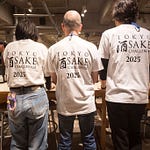Welcome to Issue #91 of SIN.
There's a bit of money talk in this issue. It might be something that doesn't get considered enough when talking about sake and the sake industry.
Inflation is a natural part of any economy and although Japan is no exception to this, inflation has been sluggish for decades. This means that when inflation does finally kick in and prices go up significantly, it hits a little harder.
Sake prices have long been considered low beyond economic reason and its only fair that these prices should eventually rise. Doesn't mean it doesn't hurt though.
Along with the laws of commerce, another factor in the sake industry that is influencing price increases is the emergence of new breweries. Breweries that are operating under "miscellaneous liquor" production licenses producing doburoku and also the small handful that have taken advantage of the government's "export-only" license have emerged with products way beyond the price range that the market has been used to.
One of the main reasons behind this discrepancy is that these new enterprises aren't sitting on land and facilities that have been handed down through generations for (sometimes) hundreds of years. It takes a lot of yen to build a brewery from scratch and despite the miniscule market share these new breweries occupy in the local market, their presence is still felt.
Could these be the twilight years for bargain-priced sake? Time will tell...
And now for the news...
Beginning Of The End For Fukuoka Brewery
Fukuoka- Well-known brewery, Taka Masamune sadly filed an application for bankruptcy with the Fukuoka District Court on June 1. The brewery is a long-established shochu and sake producer, known for its ties with local baseball team, the Fukuoka Softbank Hawks. The company boasts a 180-year business history with sake production under the label, Taka Masamune being established in 1935.
The brewery operated for a period under the umbrella of a larger brewer, but was acquired through majority shareholdings a number of years ago by liquor wholesaler, Haretake Shōten, which also filed for bankruptcy on the same day.
Taka Masamune had enjoyed its fair share of success and accolades for its sake and shochu over the years, reaching annual sales of approximately JPY5.1 billion (USD35mil) in the fiscal year ending 2006.
However, the company's performance slowed due to severe price competition and a decline in shipments to retailers and other domestic customers, resulting in annual sales dropping to to approximately JPY2.701 billion (USD1.4mil) by 2022.
The combination of thin margins in supplying mass retailers, the encroachment of cheaper alcohol options from foreign markets and the rise in price of raw-materials led to the brewery - and its affiliate Haratake Shōten being forced to begin bankruptcy procedures.
The brewery is currently looking at debt of approximately JPY3.6billion (USD25mil).
JG: Lately we have been reporting more on revived, saved and “come back” breweries in the industry. Let us not forget that there are more that end up closing than make that come back. Tangentially, I just heard of another brewery today that I am quite fond of that is showing indications that they might not make it either. And there are many more like that. All we can do is wish the best for all involved, and remember to do our part by promoting and proselytizing about sake. Oh, and drinking it too.
鷹正宗
Naga No Rice
Nagano- Rice production in Nagano Prefecture has dropped to its lowest in ten years as the region continues to feel the fallout of the COVID pandemic.
In 2014 the region was producing as much as 7144 tons a year. This fell to 3422 tons in 2022. As businesses prepared to return to pre-COVID conditions, a number of breweries opted not to increase production due to the lack of sake rice, creating a troubling scenario for rice growers that were hoping to plant more rice.
Listen to this episode with a 7-day free trial
Subscribe to Sake Industry News to listen to this post and get 7 days of free access to the full post archives.












